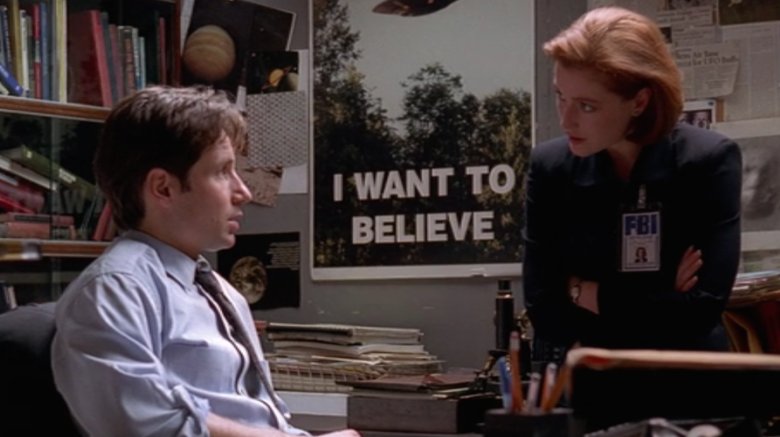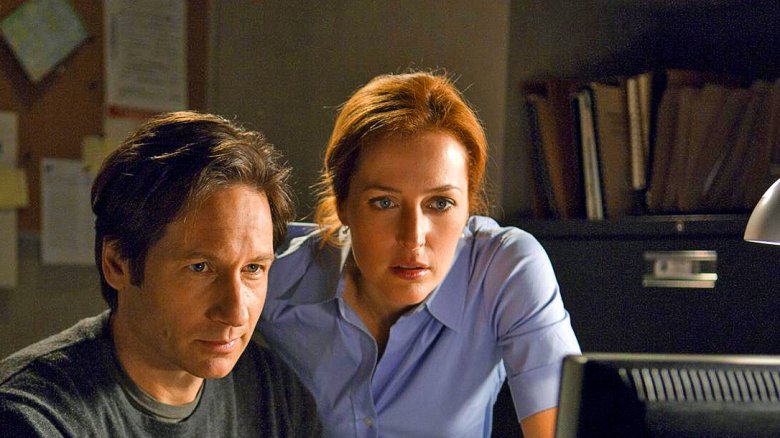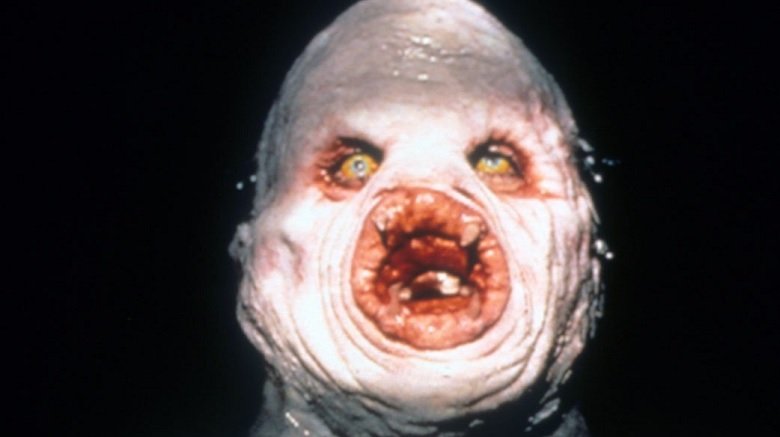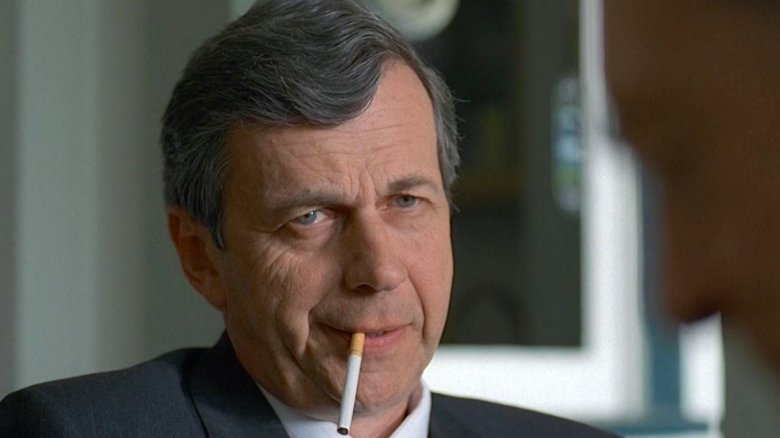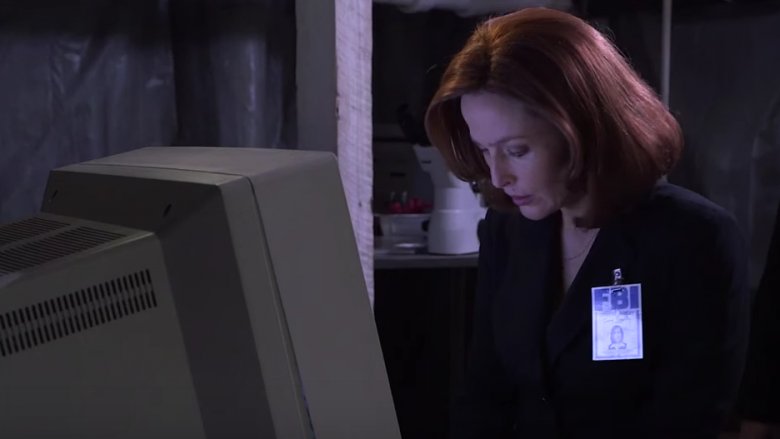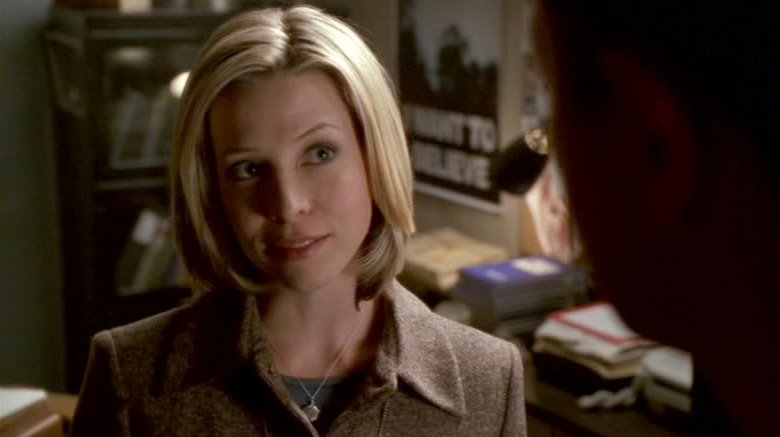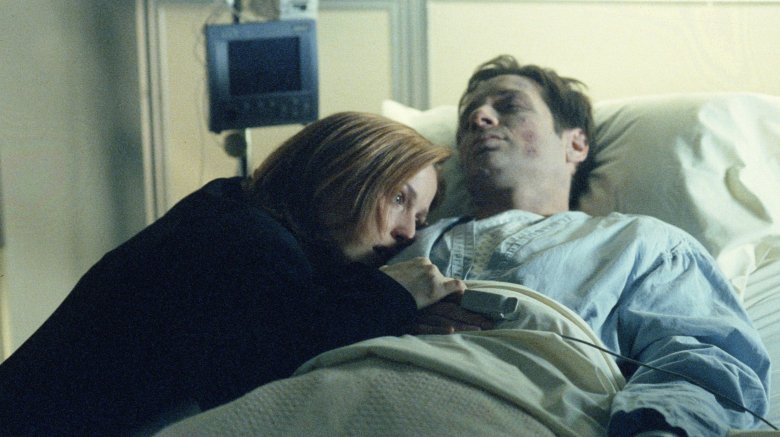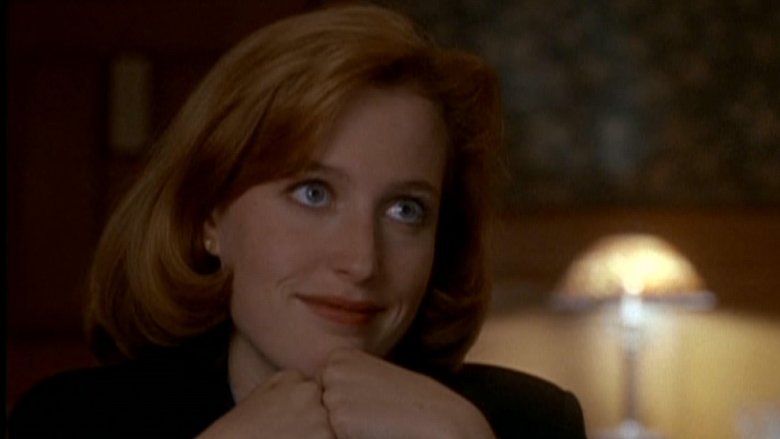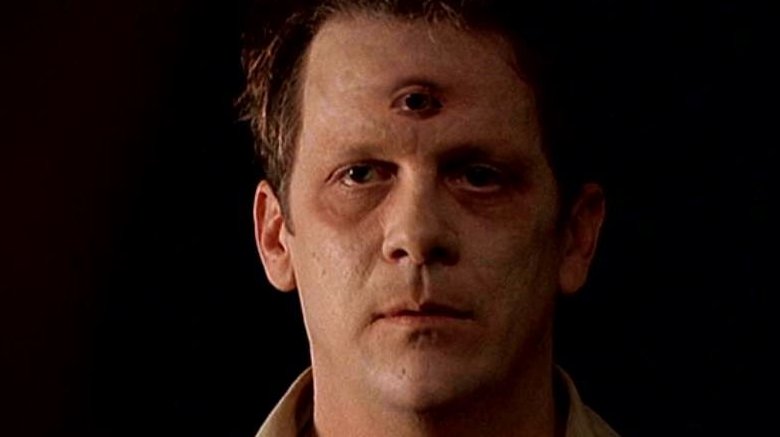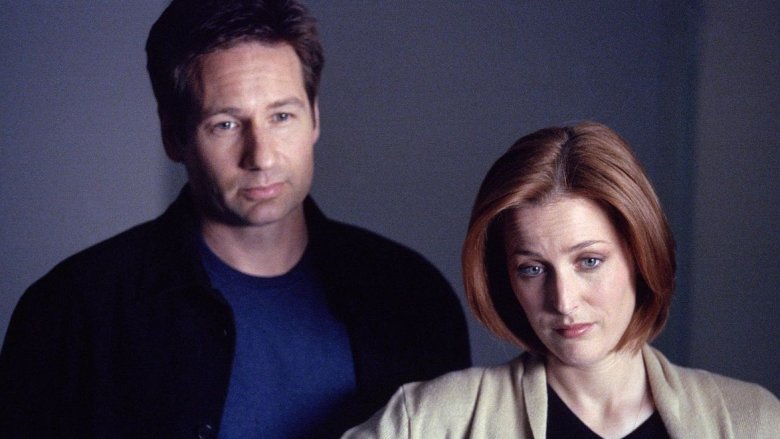How The X-Files Changed TV And No One Noticed
In the television milieu of the early '90s, one show stood out among its peers. A true combination of scientific thought and paranormal theories, The X-Files changed the television drama landscape forever. FBI agents Fox Mulder (David Duchovny) and Dana Scully (Gillian Anderson) would become the ideal investigative team, especially if the investigation veers into the unnatural, the otherworldly, or the impossible.
The show helped genre television reach new, unforeseen heights, and had a hand in inspiring many of our favorite television series today. And beyond that, it made an entire generation of viewers want to believe. Boosted by one of the most iconic opening themes in all of television history (on par with The Twilight Zone) and the incredible on-screen chemistry between Duchovny and Anderson, The X-Files has remained a cultural touchstone even more than 25 years later. Just what is it — other than the alien conspiracy, of course — that set The X-Files apart and made it such an influential series?
Successful genre television
Among The X-Files' many impressive attributes is that it took a premise that would normally be considered niche and presented it to a mainstream audience. A few years prior to its premiere, David Lynch's mystery horror soap opera Twin Peaks had weirded out and confused a very dedicated cult following. It would be natural to assume that The X-Files would have that same audience — and it did, but it somehow also managed to snag viewers who might not have previously been into science-fiction programming. Upon first airing, Entertainment Weekly dubbed the show "a goner," but only a short five years later came around to admit that it was the "wittiest, creepiest sci-fi show of all time."
The X-Files ran for nine seasons initially, and then produced two revival seasons starting in 2016 to mixed reviews. There were also two big-screen outings, 1998's Fight the Future and 2008's I Want to Believe. What was the appeal here that kept viewers coming back for more? Though it presented strange concepts and ideas, the show wrapped its weirdness in a familiar package. Ostensibly, The X-Files is a cop drama, just with a chupacabra or two sprinkled in for good measure. And Duchovny and Anderson (despite frequent speculation about their ability to get along behind the scenes) had an electric on-screen presence that drew audiences into their orbit every week. Since then, we've seen genre series like Buffy the Vampire Slayer, Supernatural, and even the rebooted Doctor Who have become hits in their own right for similar reasons.
Things that go bump in the night
It's not like people didn't know about aliens before 1993. The Cold War era was marked with a keen interest in science-fiction, from nuclear war stories, to the space race, even to tales of alien abduction. But the average person, while they might have a passing interest in the paranormal or the extraterrestrial, probably wasn't deep into all the various conspiracy theories or paranormal research that was out there. This was in the very early days of the internet, remember, when you had to seek out like-minded people on forums and message boards. But The X-Files shed some light on these dark mysteries, introducing radical ideas to a population that had been growing up with rapidly advancing technology that trumped the folktales and scary stories of yesteryear. Where else were viewers going to be introduced to not only aliens, but possessed dolls, the Flukeman, El Chupacabra, and the concept of the tulpa?
It's a conspiracy!
One of The X-Files' biggest contributions to the pop culture landscape was a fascination with government cover-ups. The Cold War officially ended in 1991, just two years before the series' premiere. As the United States got its bearings in this post-Cold War period, discomfort with some of the country's policies started to arise. The X-Files was there to capture the paranoia of the moment and help propel it into viewers' everyday lives. Just look at how Mulder's personal stake in the show's ongoing alien abduction plotline is befuddled and confounded by a government conspiracy to keep the truth from leaking to the general public. Even today, many people feel that the government is hiding information from the citizens it claims to serve. In the years since 1991, we have been taught to question our government, and The X-Files both predicted that and helped fan the flames.
Internet famous
A fairly new feature of the early '90s was the Internet. It's hard to imagine now, when every brand has a Facebook page, Twitter feed, and Instagram handle, but when The X-Files was new, it was one of the very first shows to promote itself via the World Wide Web. One of the ways it did this was through the official X-Files message board, which is still active, though much less so than it was in the show's heyday (and decidedly full of spam). In the season nine's opening credits, viewers could see the brief list of "F.B.I Contacts, Witnesses, and Contributors" flit across the screen just after Mitch Pileggi's (Walter Skinner) credit. This list was composed of fans' screen names from that original official message board, incentivizing viewers to tune in every week for a chance to see their pseudonym in lights, so to speak.
Loving the fandom
The X-Files enjoyed a lot of Internet hype, even outside of official channels. Fans calling themselves "X-Philes" populated fan sites, shrines to Mulder and/or Scully, and fan fiction forums. The X-Philes fandom is even responsible for popularizing the term "shipper." The show's team was not unaware of this trend, and instead of turning a blind eye to it, they embraced it — in one episode, particularly.
In the 2001 episode "Alone," the show introduced a young, excited FBI agent by the name of Leyla Harrison (Jolie Jenkins) into the team. This character was named for a well known X-Files fan fiction writer who had died earlier that same year. It is a touching acknowledgement of a fanbase that so frequently meets harsh criticism from other fans: women who love a thing so passionately that they engage in it and promote it through indulgent fan works. The X-Files team knew that it was important to uplift this kind of voice, because those were the voices that were helping the show to succeed.
Best friends
A central aspect of The X-Files just how well Mulder and Scully work as a team. It's enjoyable to watch them trading banter and helping each other out because it is clear that they really respect each other. Even though there isn't a complete absence of sexual tension (and their relationship begins to get steamier as the seasons move forward), there is always the sense that underneath everything else, they care about each other outside of a romantic connection. They are friends, and they are equals. Neither of them could work as efficiently without the other.
Platonic male-female partnerships in television and film are very rare, but they have become more prevalent as time has passed. Take Pete Lattimer (Eddie McClintock) and Myka Bering (Joanne Kelly) from Warehouse 13, for instance. They are two secret agents working for a mysterious government agency that recovers strange objects for the safety of the general population. Sound familiar? It is obvious that Pete and Myka care about each other immensely, but romance is never on the table for them, even in the form of unrequited sexual tension. It is a refreshing change of pace in the world of television romances to see equal weight being given to respectful friendships.
The Scully Effect
The relationship between its two leads may have been the heart of the show, but the character of Dana Scully by herself was also groundbreaking. Portrayed as an equal to her partner, Scully is whip-smart, completely rational, and ready to debunk some of Mulder's crazier theories with logic and science. She was not on the show to be a sex symbol (though surely many viewers found her keen intellect very appealing). She had an active role, a fully fleshed-out background, and clear motivation. Dana Scully was a complete character, and Gillian Anderson's portrayal of her not only influenced countless female characters to follow, but a whole generation of young women and girls.
There is a phenomenon (though not necessarily a paranormal one) called the "Scully Effect," which asserts that more young women were inspired to consider or pursue STEM careers because of the positive influence of Scully in their media consumption. The phenomenon has actually been studied, in a partnership between 21st Century Fox, the Geena Davis Institute on Gender in Media, and J. Walter Thompson Intelligence. The study concludes that about two-thirds of women working in STEM — a staggering amount — count Scully as their personal role model and inspiration. Scully is easy proof that we are very, very influenced by our media. Mulder might call that a conspiracy in and of itself!
Not just another pretty monster
An interesting feature of The X-Files' format was that it combined two different types of storytelling in order to flesh out the show. Alongside Mulder's complicated history with his kidnapped sister and the various encroaching government conspiracies is a fairly straightforward monster-of-the-week type of show. Having Mulder and Scully solve these day-to-day upsets lends some veracity to the series, as it doesn't hyper-focus on one specific event for too long. Real life is a bunch of separate moments, taken day by day, and maybe somewhere down the line we figure out something that has been nagging at us — what type of career we'd like, or how to fix a mistake we made. And so, Mulder and Scully do their job, day by day, and slowly put the disparate puzzle pieces together in an effort to solve their big problem... and in some cases, encounter more problems along the way.
Cutting teeth in the writer's room
Everyone has to start somewhere in their career, and for many writers and producers, The X-Files was one of their earliest television endeavors. The show's writing has often been praised, with creator Chris Carter and his team receiving several Emmy nominations for Outstanding Writing for a Drama Series, with writer Darin Morgan winning the award in 1996. Writer John Shiban would go on to write for some very recognizable shows, including Supernatural and Torchwood (which seem appropriate for someone who worked The X-Files), but also Breaking Bad (a bit of a departure from the paranormal). In fact, Breaking Bad creator Vince Gilligan first rose through the ranks of The X-Files. And before Howard Gordon became one of the driving forces behind 24, he served as executive producer for the adventures Mulder and Scully. Many involved in the series have stuck to what they know, but for those who have branched out, they've gone on to do some pretty impressive work on some of the most influential series in television.
TV budget, Hollywood aesthetics
Beyond all the groundbreaking writing and influential acting, The X-Files just looked cool. Series creator Chris Carter proved that you could have a sophisticated Hollywood look without a hefty Hollywood budget. With his vision and the help of many talented directors, shots were framed and lit just-so and special effects were utilized to great success. By rights, The X-Files should have been a low-budget sci-fi monster show, but the team's dedication to creating something attractive and affecting shines through.
Now we're accustomed to seeing polished television shows like Game of Thrones or even Law and Order, to some extent. But back in '93, The X-Files was an outlier in its stylish approach to presentation, more of a mini-movie than a "tune in next time" serial. The X-Files taught us to expect more — not only of our government and the wide, weird world around us, but also in our media and what it could achieve.
